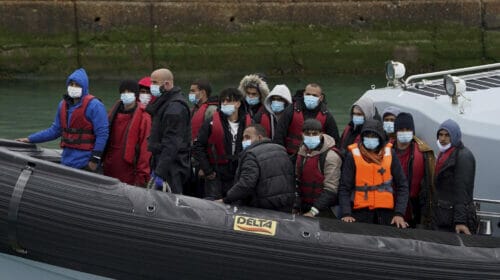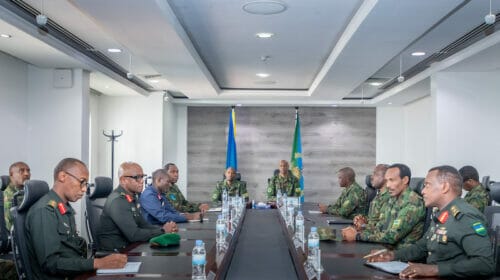Rwanda’s Rampaging Rebel Force
 by: Philippe Bolopion
by: Philippe Bolopion
Despite supporting a brutal rebel group in the Democratic Republic of Congo, Rwanda is about to take a seat on the U.N. Security Council.
Few countries dare challenge the Security Council the way Rwanda does; even fewer get away with it. Yet on Tuesday, despite backing an abusive rebel group that has attacked U.N. peacekeepers in the neighboring Democratic Republic of the Congo, Rwanda will take a two-year seat on the council. At the famous horseshoe table, Rwanda will get to make life-and-death decisions on the future of countries in crisis, including the very neighbor it is accused of destabilizing.
How could this be? The facts came out in June, when a U.N. group of experts monitoring sanctions in eastern Congo published a report accusing Rwanda of supporting, as it had done before since the late 1990s, a Congolese rebellion this time named March 23. Even by Congolese standards, M23 has a sinister record: One of its leaders is Bosco Ntaganda, a fugitive from the International Criminal Court accused of war crimes, including murder, rape, sexual slavery and recruitment of child soldiers.
As our own research at Human Rights Watch confirmed, Rwandan Army officials were providing M23 with weapons, ammunition and hundreds of young Rwandan recruits, and even sending their troops into Congo to assist them. Despite Rwanda’s virulent denials, the diplomatic machinery kicked into gear, with the U.S. government making discreet efforts to encourage its Rwandan ally to use its “influence” to stop the violence.
But throughout the summer Rwandan support continued unabated, enabling M23 to do what its leaders know best: commit widespread crimes, including killing civilians and summarily executing boys who tried to escape recruitment. A 32-year-old woman from Chengerero told us that on July 7, M23 fighters broke down her door, beat her 15-year-old son to death and abducted her husband. Before leaving, they raped her, poured fuel between her legs and set her on fire. In Muchanga, a 15-year-old girl described being raped by an M23 fighter who stole the money for her school fees. The list goes on.
According to the U.N. experts’ report, M23’s de facto chain of command “culminates with the Rwandan Minister of Defense General James Kabarebe.” The experts concluded that in July Rwandan Defense Force commanders operated alongside M23 during operations that targeted a U.N. base in Kiwanja and killed a U.N. peacekeeper.
And yet the Security Council failed to put Rwanda on notice. Instead, on Oct. 18, benefiting from a practice of rotation among African countries, Rwanda ran unopposed for a Security Council seat, winning 148 votes among the 193 nations in the U.N. General Assembly. Even after M23 seized control of Goma, on the eastern border of Congo, in November, causing tens of thousands residents to flee in fear of their lives, the Security Council failed to confront Rwanda.
So how do you get away with arming a rebel force that attacks U.N. peacekeepers, rapes women and recruits children? You need powerful friends, and Rwanda has had one. Born from the guilt of the Clinton administration’s inaction in the face of the Rwandan genocide, and a recognition of Rwanda’s relatively efficient use of development aid, the United States has proven to be one of Kigali’s staunchest allies. When the interim report of the U.N. experts came out in June, it was widely alleged that the United States delayed its publication, arguing that Rwanda, which had been uncooperative, should be given time to respond. The Obama administration suspended $200,000 worth of military aid, but only under a legislative requirement, all the while undermining efforts at the United Nations to denounce Rwanda’s role in the crisis.
While other countries, such as Britain, were raising public pressure on Kigali, the United States was using all the diplomatic contortions in the book to avoid public censure of Rwanda’s support for M23. Finally, on Dec. 18, President Obama called on the Rwandan president, Paul Kagame, to end “any support” for M23. Although couched in diplomatic terms, the appeal, along with candid statements by U.S. diplomats, amounted to a recognition that “quiet” diplomacy had failed to curb M23’s abuses.
But as a grim new year is about to set on eastern Congo, the United States should go much further. On Jan. 1, it should greet Rwanda, its new fellow Security Council member, with long overdue sanctions against Rwandan officials complicit in M23 abuses, making clear that a seat at the table is no license to make a mockery of the council’s resolutions.
Only once Rwanda ceases supporting M23 will it be able to make a credible contribution to the lifesaving work of the Security Council, drawing on its own tragic history as a victim of genocide, and its experience as a troop contributor to peacekeeping operations.
Philippe Bolopion is United Nations director for Human Rights Watch.
Source: hrw.org

 by: Philippe Bolopion
by: Philippe Bolopion
